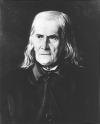Biography
Rückert was born at Schweinfurt, the eldest son of a lawyer. He was educated at the gymnasium of his native place and at the universities of Würzburg and Heidelberg. For some time (1816-1817) he worked on the editorial staff of the Morgenblatt at Stuttgart. Nearly the whole of the year 1818 he spent in Rome, and afterwards he lived for several years at Coburg (1820-1826) . He was appointed a professor of Oriental languages at the University of Erlangen in 1826, and, in 1841, he was called to a similar position in Berlin, where he was also made a privy councillor. In 1849 he resigned his professorship at Berlin, and went to live on his estate Neuses near Coburg.
When Rückert began his literary career, Germany was engaged in her life-and-death struggle with Napoleon; and in his first volume, Deutsche Gedichte (German Poems) , published in 1814 under the pseudonym Freimund Raimar, he gave, particularly in the powerful Geharnischte Sonette (Demanding Sonnets) , vigorous expression to the prevailing sentiment of his countrymen. During 1815 to 1818 appeared Napoleon, eine politische Komödie in drei Stücken (Napoleon, a Political Comedy in Three Parts) -only two parts were published; and in 1817 Der Kranz der Zeit (The Wreath of the Times) .
He issued a collection of poems, Östliche Rosen (Eastern Roses) , in 1822; and from 1834 to 1838 his Gesammelte Gedichte (Collected Poems) were published in six volumes, a selection from which has passed through many editions.
Rückert who was master of thirty languages made his mark chiefly as a translator of Oriental poetry and as a writer of poems conceived in the spirit of Oriental masters. Much attention was attracted by a translation of Hariris Makamen in 1826, Nal und Damajanti, an Indian tale, in 1828, Rostem und Suhrab, eine Heldengeschichte (Rostem and Suhrab, a Story of Heroes) in 1830, and Hamasa, oder die ältesten arabischen Volkslieder (Hamasa, or the Oldest Arabian Folk Songs) in 1846.
Among his original writings dealing with Oriental subjects are:
* Morgenländische Sagen und Geschichten (Oriental Myths and Poems) (1837)
* Erbauliches und Beschauliches aus dem Morgenland (Establishments and Contemplations from the Orient) (1836-1838)
* Brahmanische Erzählungen (Brahmin Stories) (1839) .
The most elaborate of his works is Die Weisheit des Brahmanen (The Wisdom of the Brahmins) , published in six volumes from 1836 to 1839. The former and Liebesfrühling (Spring of Love) (1844) , a cycle of love-songs, are the best known of all Rückert's productions.
From 1843 to 1845 he issued the dramas Saul und David (1843) , Herodes der Große ('Herodes the Great') (1844) , Kaiser Heinrich IV (1845) and Christofero Colombo (1845) , all of which are greatly inferior to the work to which he owes his place in German literature. At the time of the Danish war in 1864 he wrote Ein Dutzend Kampflieder für Schleswig-Holstein (A Dozen Fight Songs for Schleswig-Holstein) , which, although published anonymously, made considerable impression on audiences. ..






